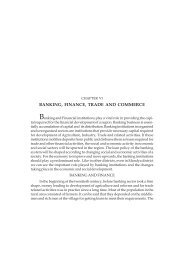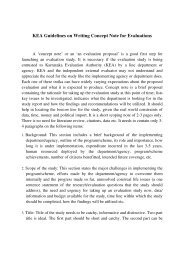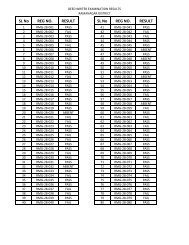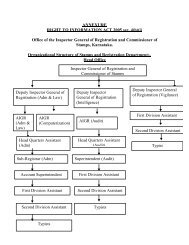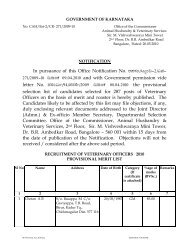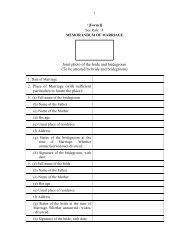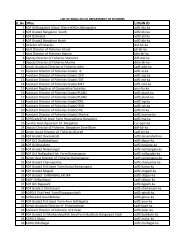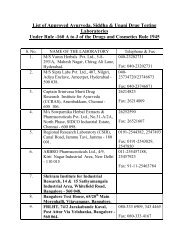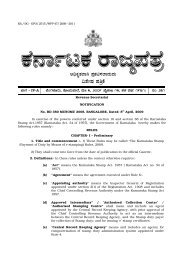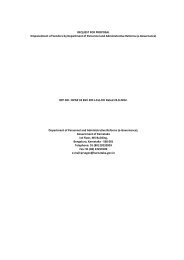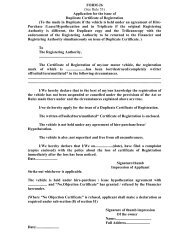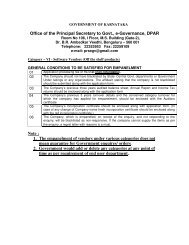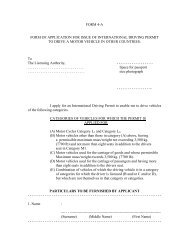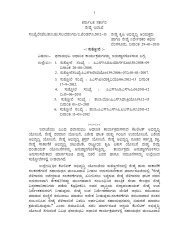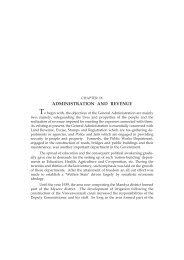Chapter XIII CULTURE - Government of Karnataka
Chapter XIII CULTURE - Government of Karnataka
Chapter XIII CULTURE - Government of Karnataka
You also want an ePaper? Increase the reach of your titles
YUMPU automatically turns print PDFs into web optimized ePapers that Google loves.
A Handbook <strong>of</strong> <strong>Karnataka</strong> 486<br />
translators upto 2008. In 2009 the Academy merged with Kuvempu Bhasa<br />
Bharati <strong>of</strong> Mysore, with an <strong>of</strong>fice at Bangalore.<br />
Tulu Language and Literature<br />
Tulu is one <strong>of</strong> the rich and ancient languages <strong>of</strong> the Dravidian family.<br />
Tulu speaking people are called Tulavas mostly found in Dakshina Kannada<br />
and Kasargodu district <strong>of</strong> Kerala. Tulunadu is bounded by the Kalyanapura<br />
river in the North, Arabian sea in the west, Western ghats in the east and the<br />
Payaswini/Chandragiri river in the south.<br />
Tulu has its own linguistic pecularities and shares a number <strong>of</strong> common<br />
features with Kannada and other Dravidian languages. Tulu has a very vast<br />
folk tradition which has its own pecularities. Folklore in Tulu is mainly found<br />
in the form <strong>of</strong> Paddanas, Sandi, Kabita, Uralu, Padipu, Nritya-padya, Gadi,<br />
Ogatu, Jogula, Ajjikathe etc.,<br />
Tulu Brahmins are generally educated people in the Vedas and Shastras.<br />
Their folk songs are based on the episodes from the epics ‘Ramayana’ and<br />
‘Mahabharatha’. Among the lower castes and untouchables, the Bhuta worship<br />
tradition is prevalent.<br />
When compared with other Dravidian languages, Tulu has a very little<br />
classical literature. During the past 150 years, Tulu has adopted the Kannada<br />
script for its literary works. Even though the works <strong>of</strong> Tulu literature initiated<br />
by the Basel Mission Christians were only translations <strong>of</strong> the teachings <strong>of</strong><br />
Christianity in the beginning, a few important works like the Tulu English<br />
Dictionary etc., were published. Later collections <strong>of</strong> their folksongs etc., and<br />
histories <strong>of</strong> Dakshina Kannada and Tulava Culture were also published. Works<br />
on Tulu Grammar, dialect and a doctoral theses on the structure <strong>of</strong> Tulu verb<br />
transformational analysis were published in the latter half <strong>of</strong> the Twentieth<br />
Century. The Kerala and <strong>Karnataka</strong> governments have helped in developing<br />
lexicons and text books <strong>of</strong> Tulu. Many Kannada plays <strong>of</strong> Yakshagana and many<br />
religious works also have been translated into Tulu. Notable early writers <strong>of</strong><br />
Tulu literature are Sankayya Bhagawat, Sheenappa Hegade, K.B. Narayana<br />
Shetty and M.V.Hegde. S.U.Phaniyadi established the Tulu Mahasabha in<br />
Udupi in 1928. This gave great boost to Tulu literature and culture. It led to a<br />
linguistic-cum-cultural movement in Tulu.<br />
The Tulu theatre and dramas developed during this period. K.Doddanna<br />
Shetty, K.N.Tailor, Rama Kirodiyan, U.R. Chandar, K.B. Bhandari,<br />
Machendranath, Ramananda Charya, Sitaram Kulal, P.S.Rao, Vishu Kumar<br />
etc. were the pioneers <strong>of</strong> the Tulu Theatre. The beauty <strong>of</strong> Tulu idioms, proverbs<br />
and expressions is very well represented in the social activities <strong>of</strong> this period.<br />
Yakshaganas, the spectacular folk dances <strong>of</strong> <strong>Karnataka</strong> are becoming popular<br />
even in Tulu now-a-days. In recent years, Tulu poets like Amrita Someswara,<br />
Anatharam Bangady, Purushottama Punja, Nityananda Karanth, Ashok A.<br />
Shetty, K.Shekar.V.Shetty, G.Bayaru, Madhukumar and A.N.Shetty have<br />
composed Tulu Yakshagana epics. There are some organisation which are<br />
working for the propagation <strong>of</strong> Tulu language and culture. Tulu Koota <strong>of</strong>



